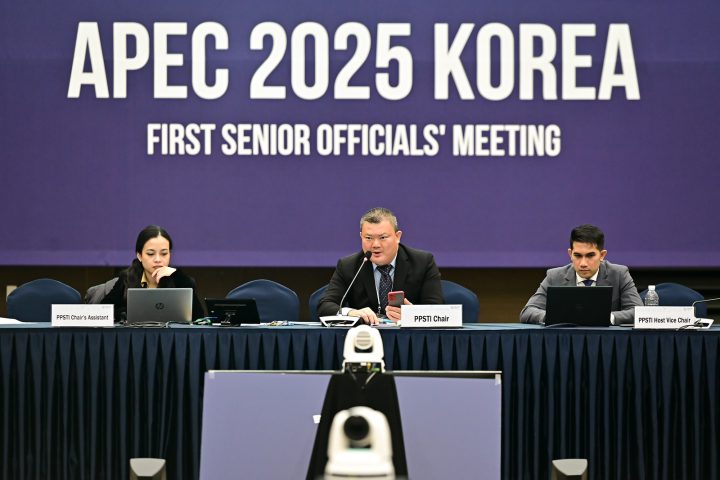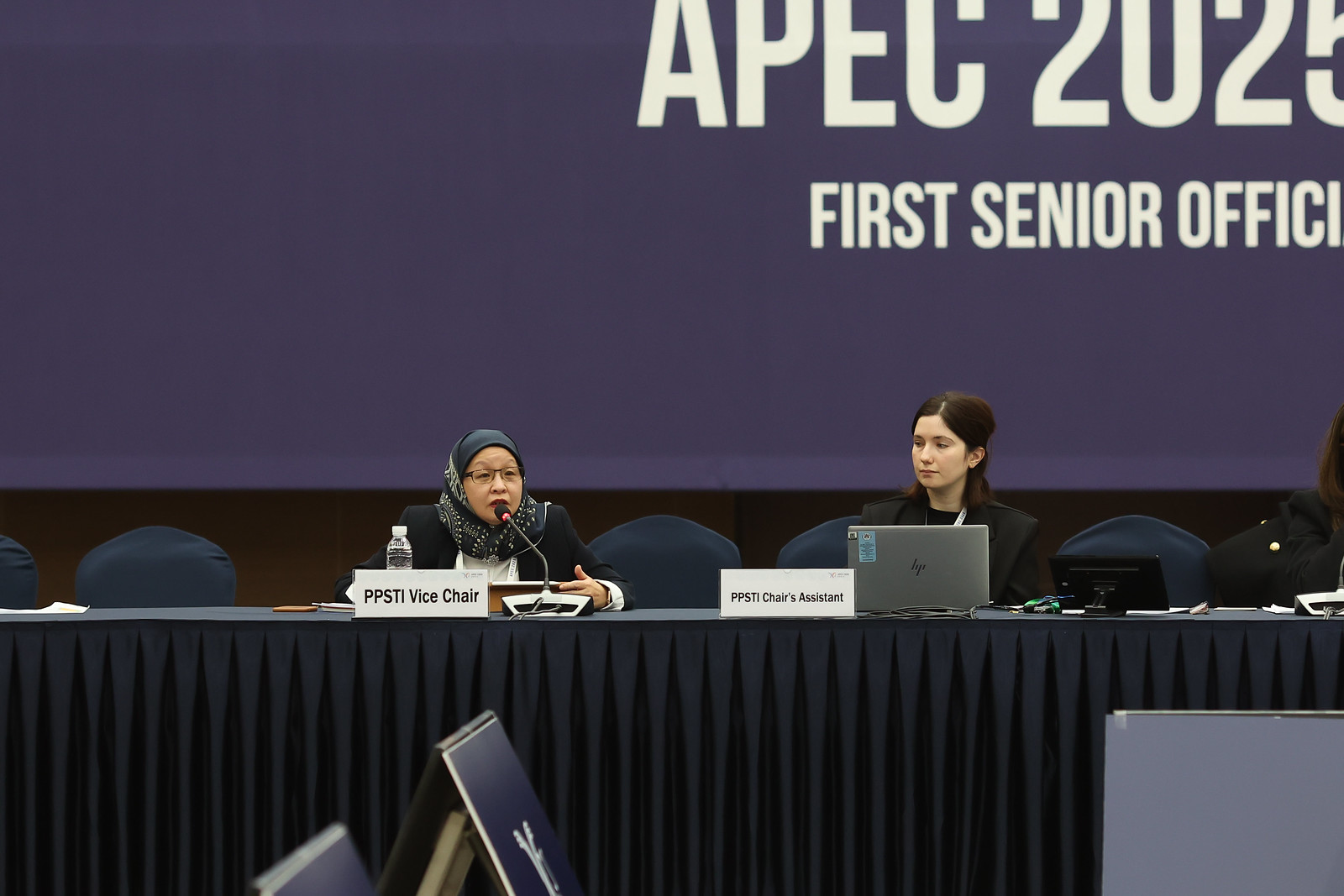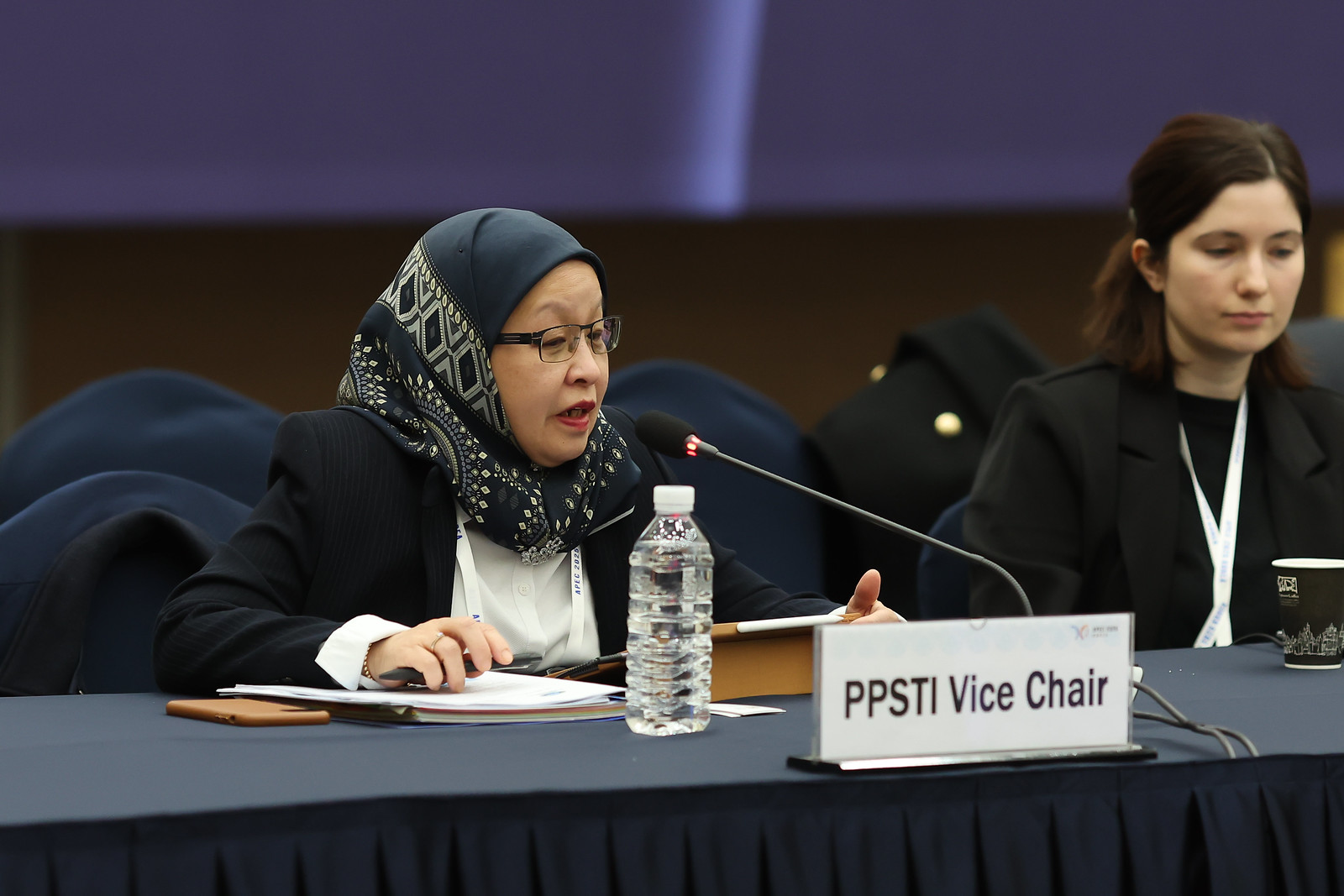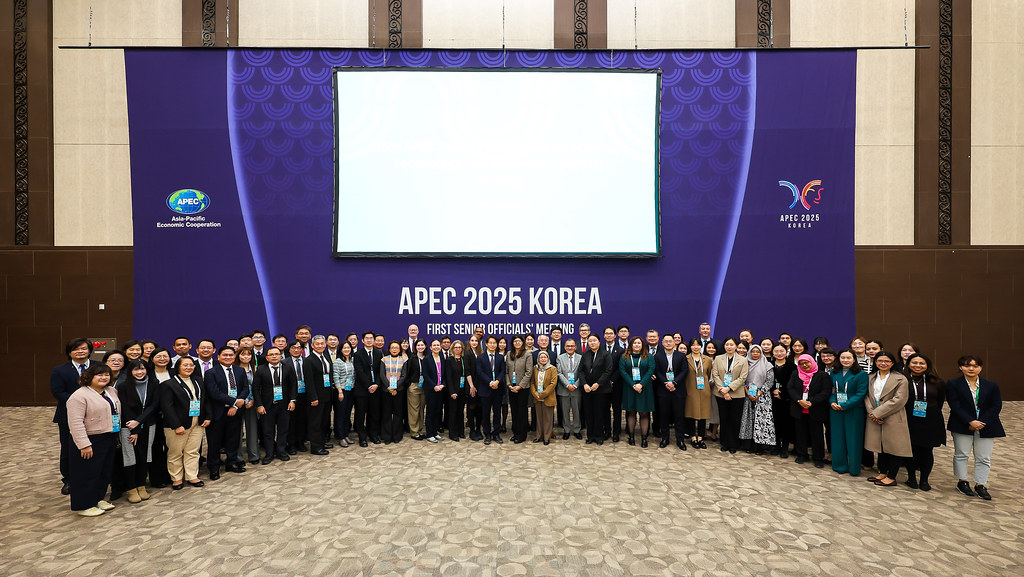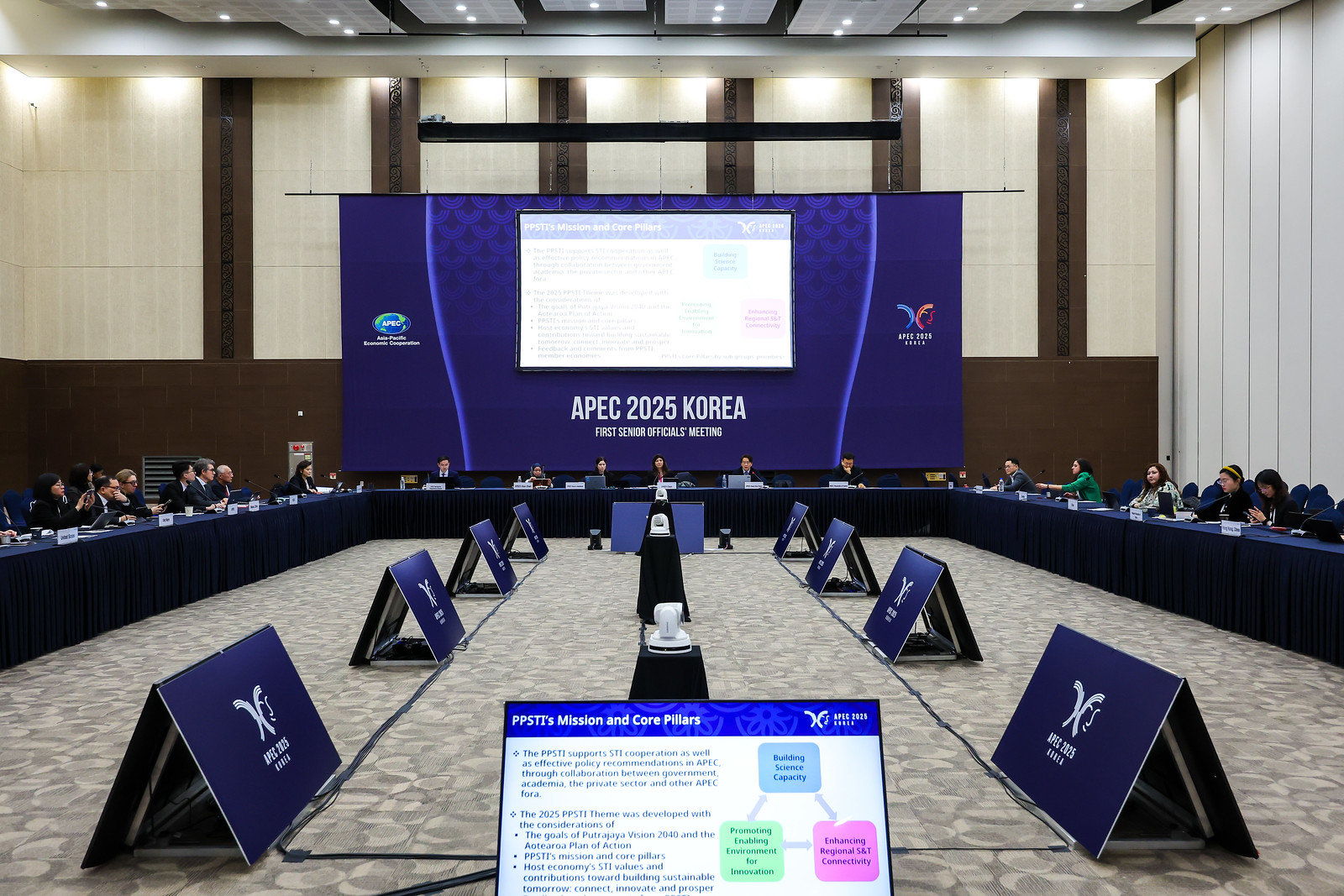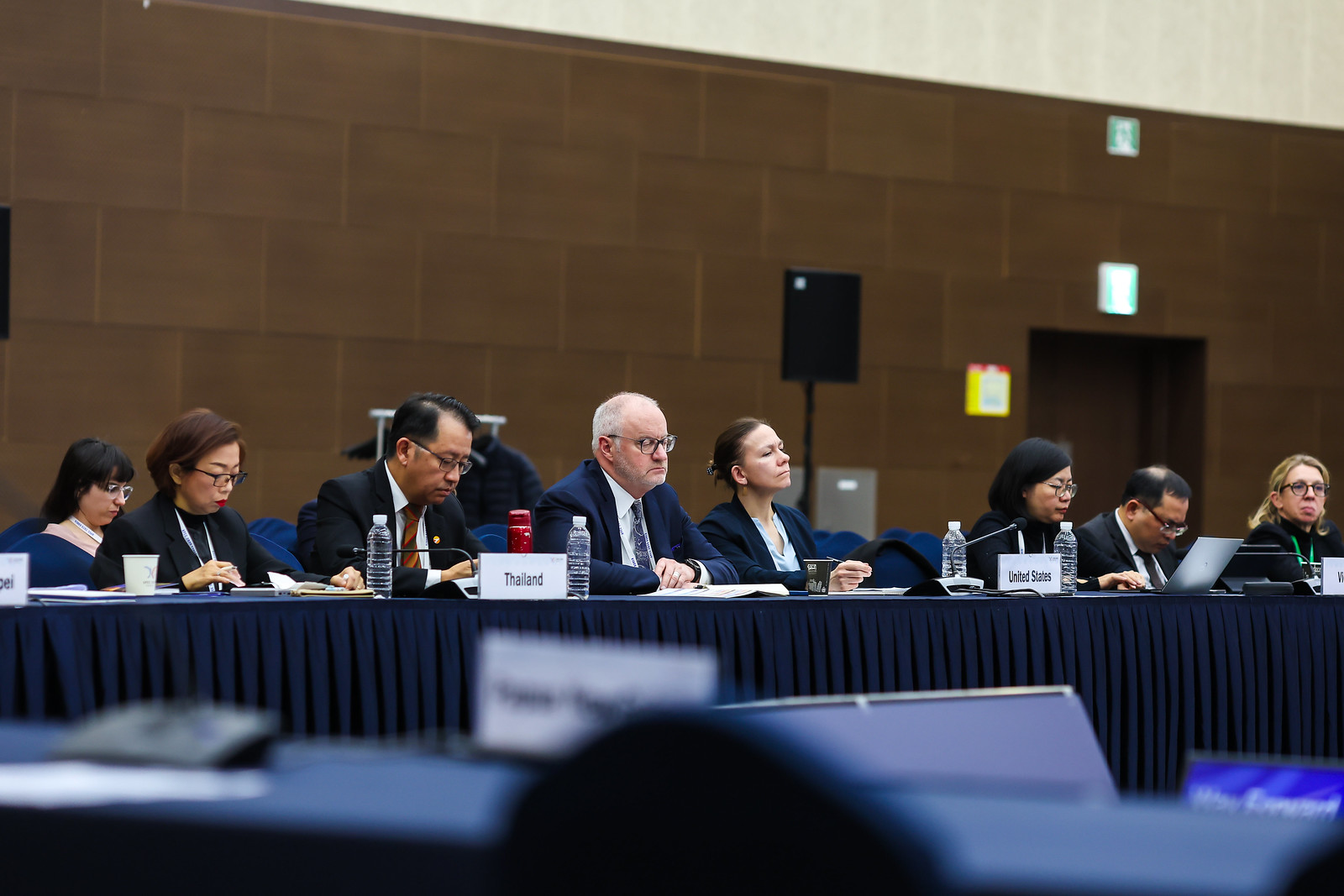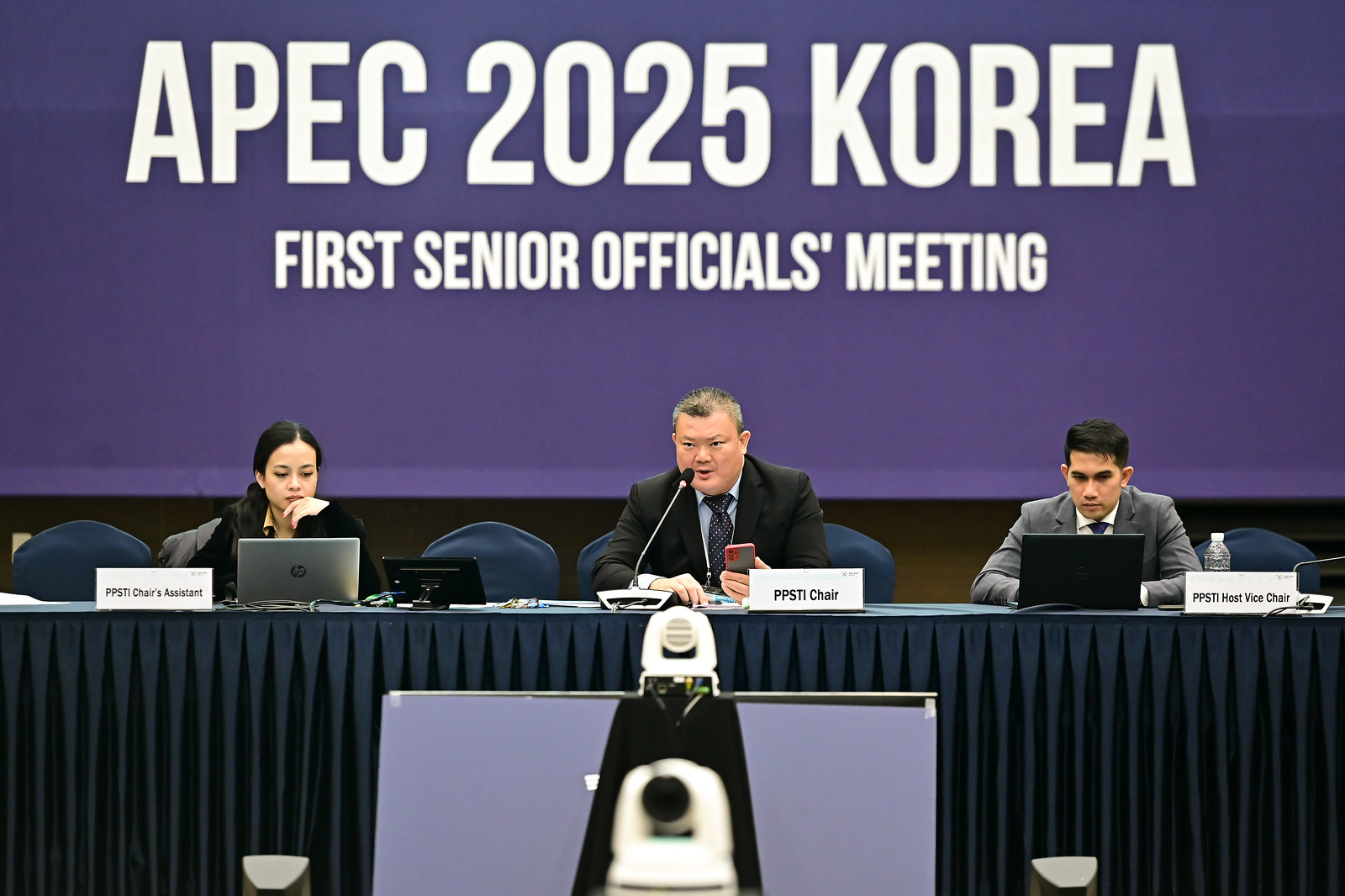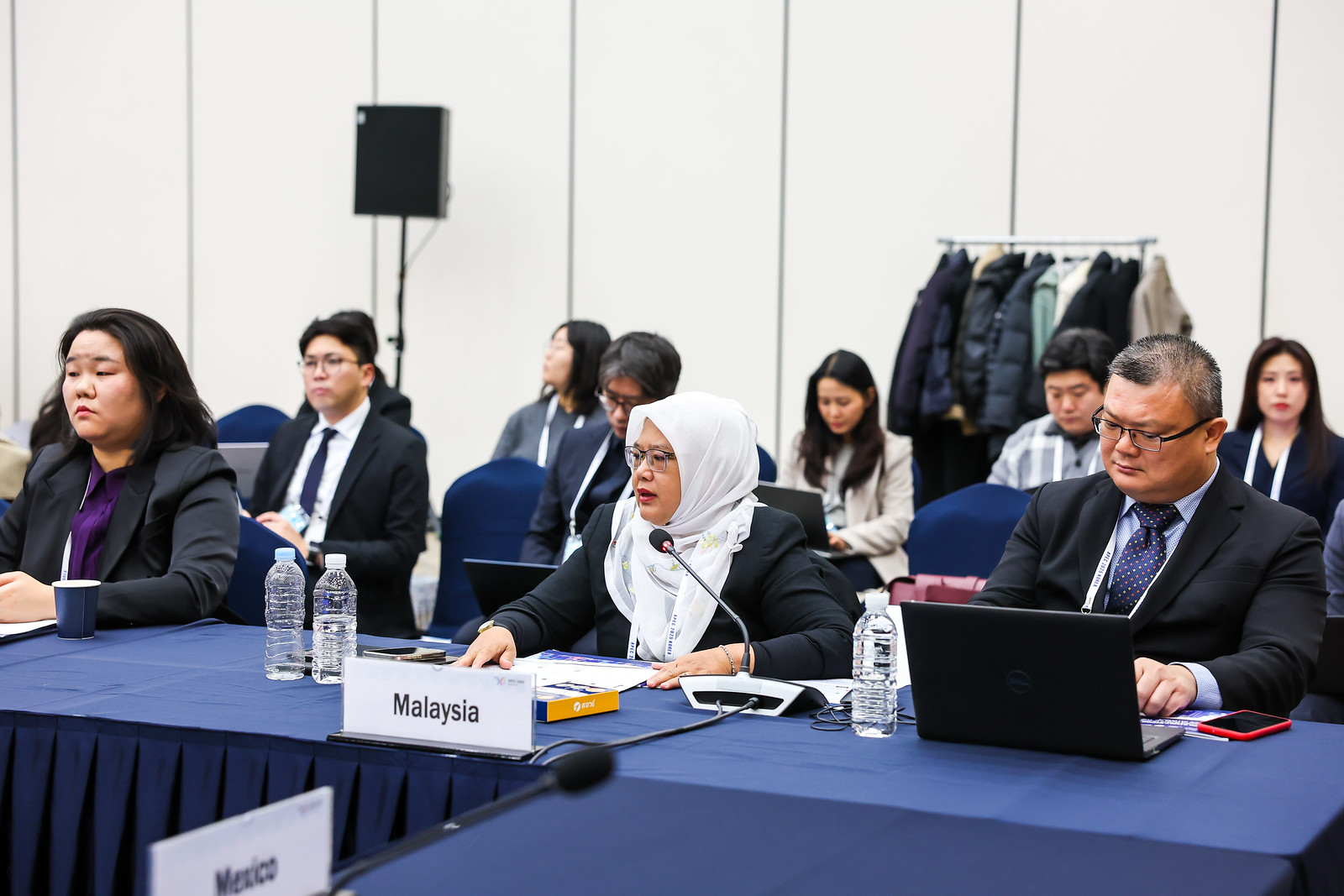
The Data Stewardship for Open Science Training Returns in 2025!
March 12, 2025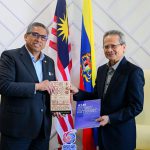
Courtesy Visit to the Chief Secretary to the Government
March 19, 2025The 25th APEC PPSTI meeting was held in Gyeongju, South Korea, from 24 to 25 February 2025. The meeting saw the participation of 17 out of 21 APEC economies, including Malaysia. ASM CEO Puan Hazami Habib served as Vice-Chair of PPSTI. At the same time, Senior Principal Assistant Secretary from the Ministry of Science, Technology and Innovation (MOSTI), Lee Chee Peng, represented her as chair of the PPSTI Subgroup on Capacity Building.
ASM Secretary-General, Professor Dr Noorsaadah Abd Rahman FASc, presented the 2024 APEC Open Science Alliance (APECOSA) workshop series outcomes and outlined the alliance’s way forward. Plans were proposed to establish formal contact with open science focal points from each APEC economy to form the alliance by 2026, with a pilot project utilising the alliance set for 2027.
This year, APEC highlighted emerging areas such as artificial intelligence, quantum technology and biotechnology. The meeting also discussed the pilot project on mission-oriented innovation policy and the APEC Scientist Exchange Travel Card. Additionally, the Terms of Reference (TOR) and strategic plan for PPSTI 2026–2035 were reviewed, with Malaysia serving as a drafting committee member.
Key Initiatives and Updates
APEC Scientist Exchange Initiative
The Republic of Korea introduced a self-funded pilot project to facilitate short-term academic training for scientists using the APEC Scientist Travel Card (ASTC). The program, covering disciplines like physics and biology, aims to streamline travel processes. While members supported the initiative, they sought further clarification on eligibility, funding, and integration with the APEC Business Travel Card.
Mission-Oriented Innovation Policy (MOIP)
The MOIP pilot was endorsed, with sub-groups tasked with defining key objectives aligned with the Sustainable Development Goals. The OECD shared insights on MOIP’s structured approach to mobilising STI for targeted objectives, emphasising monitoring and evaluation.
APEC Projects and PPSTI Growth
The Secretariat reported a rise in APEC-funded projects, with PPSTI leading with 24 projects in 2024, up from 16 in 2023. However, concerns were raised over project overload, budget underspending, and the review process. MOIP was recognised as a tool to refine project selection and ensure impactful resource allocation.
APEC Open Science Alliance (APECOSA)
Malaysia presented findings from the APECOSA report, addressing challenges in scientific data sharing. Malaysia proposed that the next steps include establishing an open science focal point in each economy, developing Terms of Reference by 2026, implementing policies for data stewardship, and launching a pilot project by 2027. PPSTI members expressed strong support and interest in further collaboration.
Private Sector Engagement
Chinese Taipei shared the outcomes of a Cross-Border Startup Pitch Event, where 24 startups and 13 venture capital firms from 11 economies formed seven potential investment connections. Expanding these events was proposed to strengthen APEC’s startup ecosystem. PPSTI members recognised the role of venture capital in fostering innovation and growth.
New PPSTI Proposals and Sub-Groups
China, Korea, and Peru have introduced new PPSTI project ideas and invited collaboration. Sub-groups led by Malaysia, China, and Chinese Taipei reviewed ongoing initiatives focused on building science capacity, enabling innovation, and enhancing regional connectivity.
Policy Dialogue on Emerging Technologies
Korea led discussions on maximising the socio-economic benefits of emerging technologies. Presenters from OECD and STEPI emphasised international governance in addressing AI, quantum computing, and biotechnology risks and opportunities. APRU and eight economies shared initiatives on generative AI and technological convergence, advocating for regional cooperation.
ASPIRE Prize and PPSTI Strategy Updates
The Republic of Korea reaffirmed its sponsorship of the ASPIRE Prize and proposed forming a steering committee for the Prize’s continuity. Canada, Chile, Russia, and Malaysia reviewed PPSTI 10-year Strategic Plan updates, ensuring relevance to current priorities and streamlining operational guidelines.
PPSTI members reaffirmed their commitment to strengthening STI cooperation through open innovation, emerging technology governance, and inclusive scientific collaboration, aligning with APEC’s long-term objectives.
Steering Committee on ECOTECH (SCE) Committee of the Whole Meeting (COW)
In 2025, SCE will focus on cross-cutting themes, including artificial intelligence, digitalisation, and demographic shifts, engaging with the SOM Chair’s Office to align deliverables. SCE encourages Ministerial Statements to provide forward-looking guidance for APEC and its sub-fora. PPSTI discussed a potential cross-sub-fora collaboration with the Small and Medium Enterprises Working Group (SMEWG) during the SMEWG Ministerial Meeting in September, exploring open innovation and MOIP. SCE-COW approved the PPSTI annual work plan. Chile commended the APEC Scientists Travel Card for supporting cross-border collaboration. At the same time, Canada expressed anticipation for policy recommendations from the PPSTI Policy Dialogue on enhancing the social and economic benefits of emerging technologies through APEC collaboration.
SCE Plenary Meeting (SCE1)
SCE1 endorsed PPSTI’s updates on the Phase II assessment. Peru highlighted how PPSTI complements collaborations amongst economies while enhancing STI. Peru looks forward to the updated PPSTI TOR & Strategic Plan.
All economies, specifically China, Canada, Peru, Thailand and the Philippines, supported MOIP. The economies look forward to the implementation of the MOIP project. The Philippines mentioned in their intervention their endorsement of the MOIP TOR and looks forward to its implementation. The Philippines also looks forward to the formation of the long-term objectives.
Canada applauded the good progress in updating the TOR & Strategic Plan, which aligns with SCE’s directions, which include the APEC PPSTI Center guidelines. Canada highlighted that more focus should now be given to PPSTI goals and MOIP.
Consequently, as a way forward, PPSTI needs to get the rest of the three PPSTI Centers to update their TORs, and PPSTI is expected to update their progress in the upcoming SOM3.
APEC Open Science Alliance
ASM held workshops on the APEC Open Science Alliance virtually on 20 June 2024 and in person on 18 August 2024 during APEC SOM 3 in Lima, Peru. ASM Secretary-General, Professor ChM Dr Noorsaadah Abd Rahman FASc, presented the workshop findings during the 24th PPSTI SOM1 plenary session on 24 February 2025.
The presentation highlighted commitments from APEC economies, including Australia, Canada, Chile, China, Indonesia, Japan, Malaysia, the Philippines, Korea, Russia, Thailand, and the US, to develop open science policies and platforms. Key challenges discussed included governance issues, sustainable funding, lack of persistent identifiers, and insufficient data-sharing guidelines. Capacity building remains crucial, focusing on trust, inclusivity, and training for data stewards.
The workshop introduced the Mission-Oriented Innovation Policy (MOIP) as a complementary approach, emphasising collaborative data sharing to drive innovation and transparency. It also proposed APECOSA as a platform for sharing best practices, fostering cross-border research partnerships, and supporting infrastructure and data-sharing initiatives.
By integrating open science and MOIP into mission-oriented projects, APEC economies can address pressing issues like food and health security while enhancing transparency and collaboration. The APEC economies acknowledged Malaysia’s leadership in APECOSA, reinforcing regional efforts toward a sustainable open science ecosystem.
Presentation on Key Deliverables and Updates of PPSTI
During the SCE-COW Meeting on 6 March 2025, Puan Hazami Habib presented PPSTI’s key deliverables, alignment with APEC 2024 themes and priorities, and cross-fora collaborations. The presentation highlighted PPSTI’s reinstatement of ASPIRE, SOM1 Policy Dialogue held during the PPSTI Plenary Meeting, the MOIP Pilot Project (2025-2028) implementation, and the APEC Open Science Alliance.
In addition, Puan Hazami Habib also presented PPSTI’s updates on SCE recommendations for PPSTI renewal as part of the Phase II Assessment to SCE1 on 7 March 2025. The presentation highlighted the updates and progress on PPSTI’s terms of reference and strategic plan, as well as MOIP, as an effort to increase PPSTI’s quality of projects.
In short, the PPSTI is uniquely positioned to identify, assess, and make recommendations to address challenges and opportunities to support STI growth and development in the APEC region.

